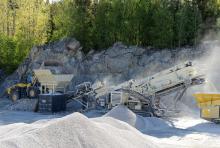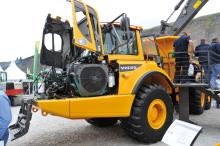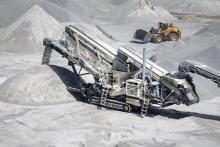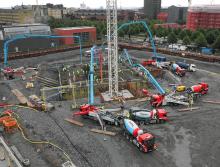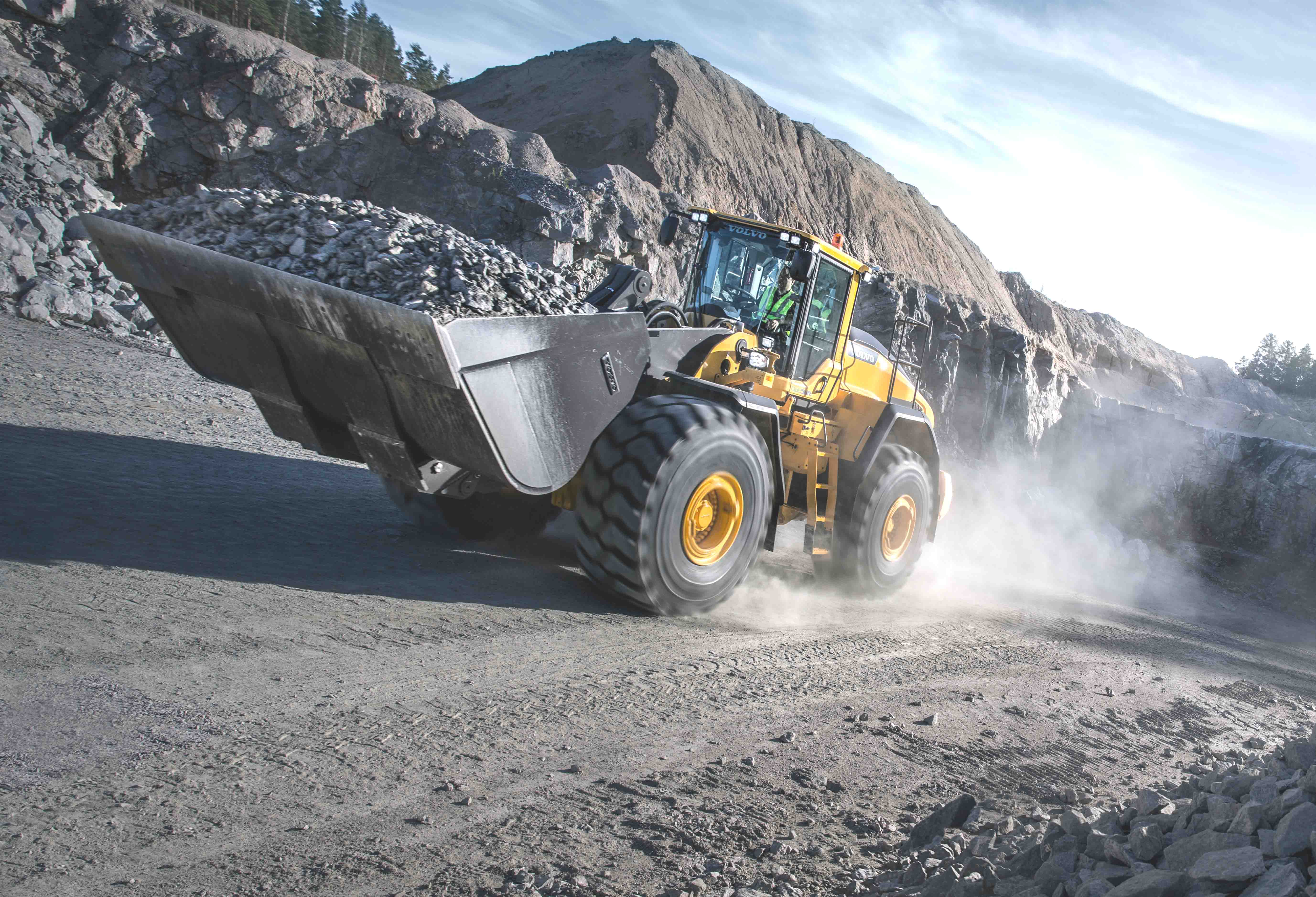
Big infrastructure projects in a number of Scandinavian countries are good news for construction equipment manufacturers as, Patrick Smith reports.
Boasting the largest quarry of its kind in the world, Scandinavia is a major player in the global quarrying and mining industry.
To back this up, the big operators are present throughout the region (Denmark, Norway, Sweden, Finland and Iceland), and there are locally-based, global equipment manufacturers catering for their requirements.
Sweden is the largest producer and exporter of iron ore in Europe and is among the leading nations in the production of base and noble metals.
“But it is not only the country’s ore deposits and mineral resources that attract the attention of the industry’s leading players,” say the organisers of the recent Euro Mine Expo held in Skelleftea, Sweden.
“Sweden is also on the international cutting edge of research, energy efficiency, environmental awareness and industrial expertise in production technology.
“Progress is facilitated by an extensive and modern infrastructure and a favourable business climate, which is illustrated by many of the industry’s most prestigious companies being based here.
“The area comprising northern Sweden, Finnish Lapland, northern Norway, and north-western Russia is extremely rich in minerals and is still underexploited.
“The potential that still exists for new mineralisations and mines has led to increased investments in exploration, particularly in northern Sweden and Finland. International capital has found its way to this area and has made the mining industry a vital driving force in national, regional, and local development.”
Only recently,
The project, currently the largest transport project in Norway, and scheduled for completion at the end of 2021, includes the country’s longest double track railway tunnel (20km). The new railway track, between Oslo Central Station and a new station in Ski municipality, Follo district, south of Oslo, will see a 50% reduction in the journey time between Oslo and Ski.
“This is a milestone for HeidelbergCement in Norway and will put great demands on both production and logistics,” says Dr Bernd Scheifele, chairman of the managing board.
In its second-quarter results the group noted that Northern Europe recorded double-digit growth in sales volumes on account of the sustained high level of construction activity in Sweden and a better than expected development in Norway.
Norway is also home to the
The total available reserves in the quarry are estimated at 350-500 million tonnes.
Aggregate Industries says Halsvik quarry is the jewel in Norway’s crown, with an annual production capacity of 2.5 million tonnes and consented mineral reserves in excess of 200 million tonnes.
In Sweden, the
“In order to build houses for a household, it takes approximately 40tonnes of ballast, and it takes about 64,000tonnes for building a kilometre of motorway,” says SGU.
“Ballast is the main raw material extracted in the country, after water.”
Asked about the equipment market in the aggregates sector in Scandinavia at the moment, David Alström, business director for Hub North,
He says that over the past year the trend of reducing risk and keeping control by utilising sub-contracting and operating leases has continued.
“The large technological changes with the introduction of Stage IIIB and subsequent Stage IV have now been adopted into operational level for both customers and dealers. For example, the use of AdBlue is now a common practice.”
He says there are some distinct differences between the markets in Scandinavia, which are reflected in the different geological conditions. Norway is almost exclusively hard rock quarrying, while Denmark is all sand and gravel. Sweden is a bit of both.
“Volvo has performed very well in the aggregates sector in Scandinavia thanks to high quality products that are well-suited for customers’ needs, as well as a strong dealer network. Our dealers provide excellent service support for high machine uptime and special adaption of the machines when needed.
“Apart from our new flagship product, the world’s first true 60tonne articulated hauler, the A60H, we have also launched a suite of soft offers and options tailored for the aggregate industry. The fuel efficiency reports and load assist, whereby the true cost-per-tonne can be derived, were launched at bauma 2016 and are now being rolled out in the markets.”
He says that Volvo CE’s most popular models among customers in the Scandinavian aggregates industry are the Volvo L150H-L180H wheeled loaders.
“These are well-known models with a good history, and the model sizes are a good match for Scandinavian customers’ productivity needs.
“We see the strongest requirements from aggregates customers as durability, productivity, fuel efficiency, operator comfort and safety. Volvo CE has always designed machines with the operator in mind, making sure that the excellent productivity and fuel efficiency in our products can be maintained over long and demanding shifts. In addition to the product features, we also have an outstanding dealer network for uptime services in Scandinavia.”
As for 2017, Alström say: “We see continued strong markets in both Sweden and Norway but there are doubts about development in Denmark going forward due to a reported lack of projects.”
Meanwhile, Sami Takaluoma,
“We don’t see any aggregate boom coming and on the other side we don’t expect the market to collapse either.
“There is a good and stable demand for equipment.
“As said above, the production volumes are not increasing so equipment demand is not driven by volume increases. Equipment technology has developed and some customers are interested in replacing existing machines to gain advantage. There are some signs of increased contracting also in Scandinavia which boosts mobile equipment demand.”
Takaluoma says mobile crushing and screening technology in aggregate equipment is the most in demand.
“Some project plans for large complex and fixed crushing plants are also under evaluation but no decisions yet,” he says.
“Metso is approaching the market by local own sales and service organisations close to the end users in Finland, Sweden and Norway. Metso aims to offer a complete solution from advanced technology aggregate equipment to complete life cycle services supporting the operations. In Denmark and Iceland we operate through our long-time partners, that is distributors.
“We are expecting a satisfying year 2016 in the Scandinavian aggregate market.”
Talking about the Swedish aggregates market, Tor Einar Norbakk, MD and territory manager Sweden and Denmark
“There are many infrastructure and real estate projects going on. The activity is expected to increase going forward as there is a considerable backlog in housing capacity. In conjunction with this, there is also a continuation of centralisation of people and that tends to mean more infrastructure projects turning into new tunnels, railways, subways and roads, and this enhances capacity on existing infrastructures.
“The need for maintenance, and the maintenance gap on these structures, is also increasing and will turn to business opportunities for our customers going forward.”
He says that the equipment that is tending to be more successful is mobile units, medium capacity and multi-purpose.
“As the business opportunities are varying within the proximity of where they want to operate, you want versatility. We are also seeing a shift in the market where the larger contractors who are winning the big contracts are basing part of their operation on an array of sub-contractors to create flexibility and capital efficiency for themselves.
“This is emphasised in the medium mobile segment. Other than this shift, we are also seeing that the fixed base of equipment is having good utilisation and continues to be the foundation of constant, underlying demand in the market.”

